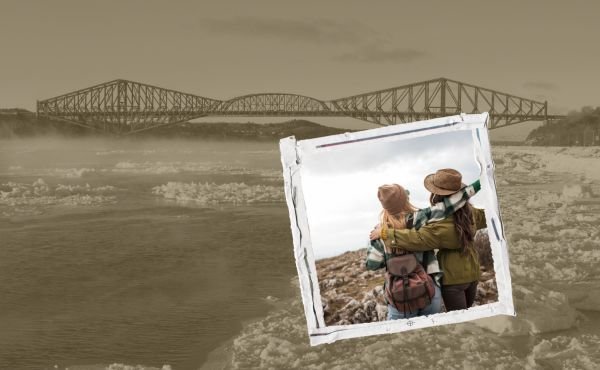Léa and Marie-Maude* are colleagues in Montreal, Canada. They became friends little by little, despite having very different backgrounds, beliefs, and interests.
* Names have been changed for privacy
How did the two of you meet?
Marie-Maude: We met at work. Léa was my first new colleague after a year and a half of remote work on a team of three people.
What makes you unlikely friends?
Marie-Maude: Léa comes from a very different background to what I am used to. She is more reserved and introverted, which contrasts with my more extroverted personality. I was intimidated by her level and field of study. I consider people with this level of education to be above average and generally very intelligent.
Léa: We have very different personalities. Marie-Maude thrives on social interaction and is comfortable in large events, while I find crowds quite draining. She’s fearless and adventurous. For instance, she is an intrepid driver, while I tend to be nervous behind the wheel. I’ll never forget the first time I got in her car!
Marie-Maude: (laughs) Frankly, working remotely full-time made it more difficult to get to know people. At first, our exchanges were pragmatic and work-focused, not social, so it seemed unlikely that we would become real friends.
What changed?
Léa: Marie-Maude taught me to become a more alert and savvy person in the workplace, to overcome my naivety and navigate tricky work relationships. She shared her experience and hard-won expertise without asking for anything in return.
Marie-Maude: Being the same age and having studied at the same university in related fields made it easier to connect. Our work environment was new to Léa, and as two young women trying to find our place in the professional world, I felt a duty to help her in what is sometimes a difficult professional context. I tried to reassure her by identifying red flags.
It’s not always easy to ask for or offer help. How did you build that level of trust as new colleagues?
Léa: We laughed together a lot, we did a photoshoot to renew our professional network pictures, and we went thrift shopping after work. We didn’t spend all our time having difficult, heavy conversations, and I think those conversations were made easier by the spontaneity of our questions and our mutual honesty. Because we respect and trust each other, no topics are taboo between us.
Can you tell us about a time when one of you helped the other?
Marie-Maude: Soon after Léa took up her post, I had to leave for four months due to illness. This was very difficult for me and I found it hard to accept. This meant that Léa had to take on a large part of my responsibilities at short notice, even though she had only just started her job, in a corporate world where adaptation normally takes several months. When I told her the news of my departure, she not only supported me but said she would pray for me. I didn’t know what to think of that at the time. Actually, I thought it was a bit strange.
Was it awkward?
Léa: Our life paths and beliefs are very different, but Marie-Maude was always extremely open. That surprised me at first. When I talked to her about my faith and my commitment in Opus Dei, she seemed very interested in knowing more, in a very positive way. I felt completely respected.
Marie-Maude: By the time I returned to work, we had the chance to develop our relationship further. I was able to better understand the meaning of 'praying for me' and grasp the significance of her offer... which then really touched me. Whatever you call it (positive vibes, daily affirmations, or prayer), the reality is that I came back to work stronger. I know that her prayer contributed to my healing. For me, this memory says a lot about Léa. I see her as an altruistic, fundamentally good person who is always ready to help the people around her.
Léa: When I was going through a rather difficult time, she talked to me about my "little Jesus" [p’tit Jésus] which touched me a lot precisely because she does not believe in him like I do.
Marie-Maude, did you know anything about Opus Dei before you met Léa?
Marie-Maude: Not much. At first I had some preconceptions about Opus Dei, but I knew they weren't based on anything very concrete. I don’t remember exactly how Léa told me that she was a numerary of Opus Dei, but I was happy that she trusted me enough to share. I asked lots of questions which she answered patiently. I am very grateful for this because now I feel I know her better and have a better understanding of her daily challenges.
What’s the most important thing each of you has learned from the other?
Marie-Maude: Léa helped me realize the value of kindness in interpersonal relationships. Her days are full of contact with people of very different ages and cultures, I am always impressed by her consideration for everyone.
Léa: For me, honesty. Marie-Maude gave me an example of honesty in friendship, exercised with courage and thoughtfulness. She has a gift for capturing people, understanding them, and encouraging them by placing herself in their shoes. I thank God for placing her in my life.
Read the first article in this series, from a pair of friends in South Africa: Unlikely Friends: Keagan and Trevor
